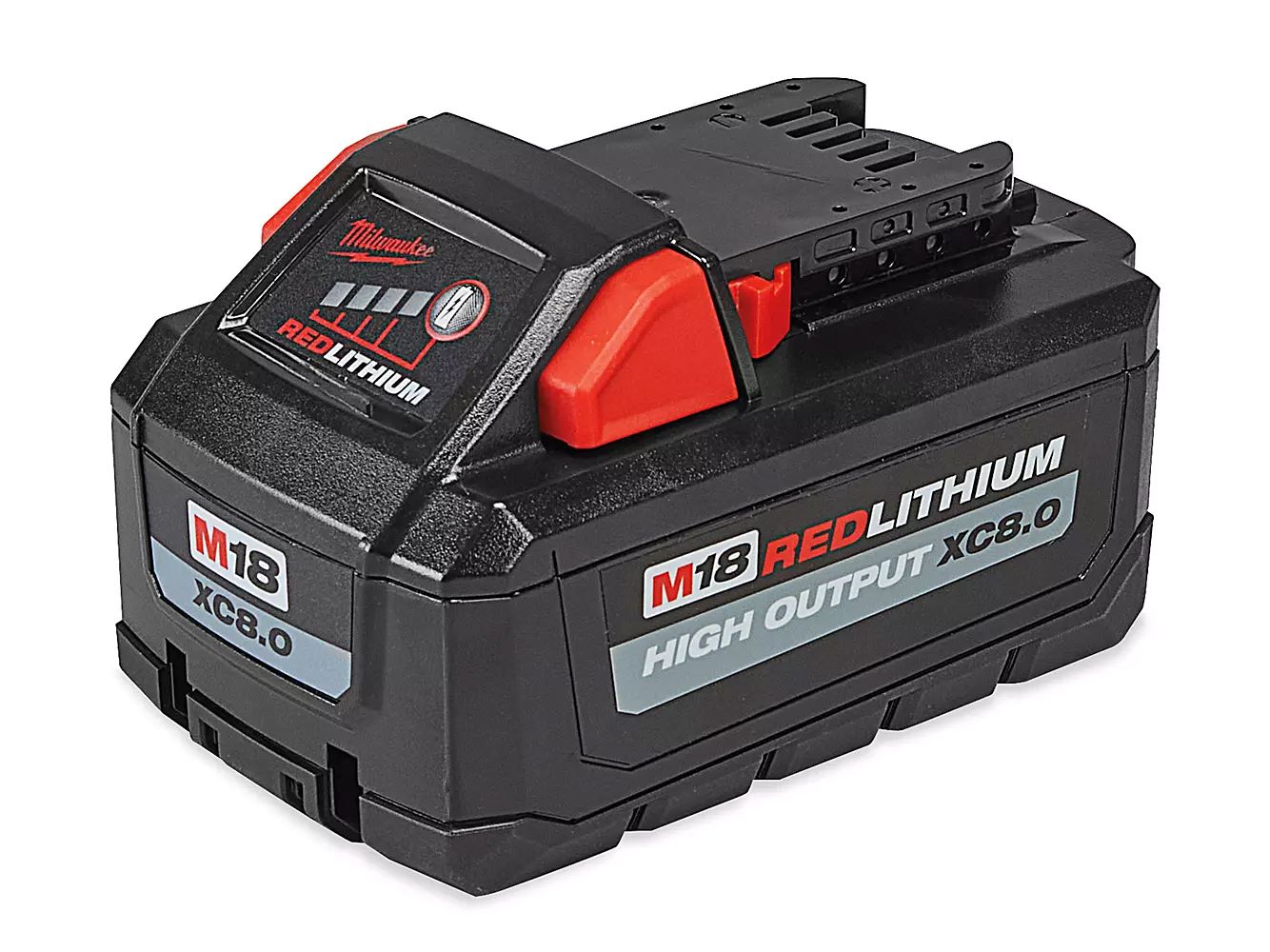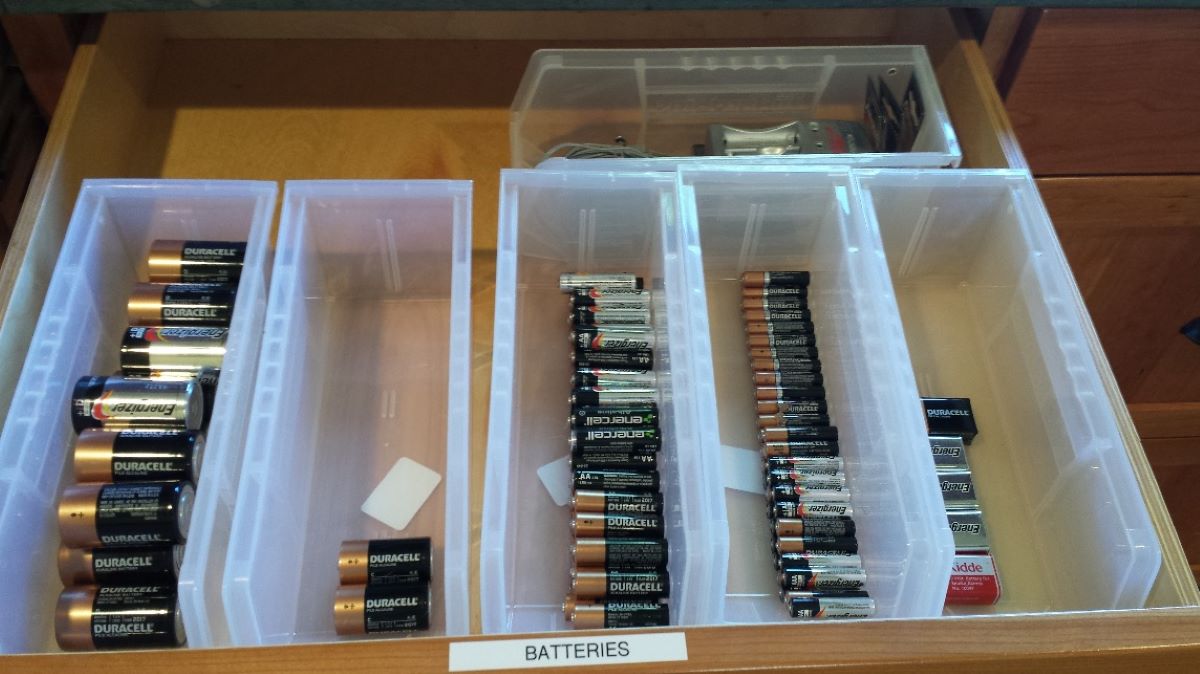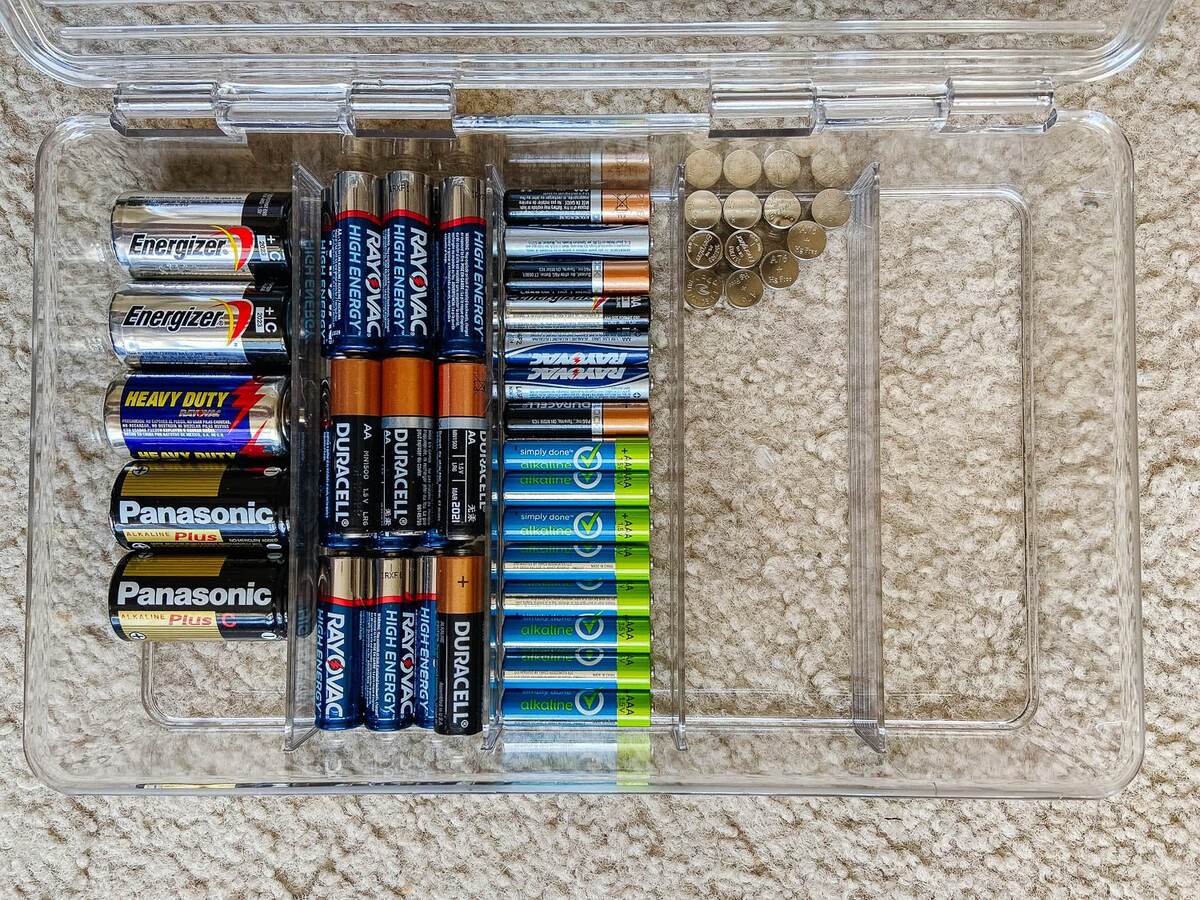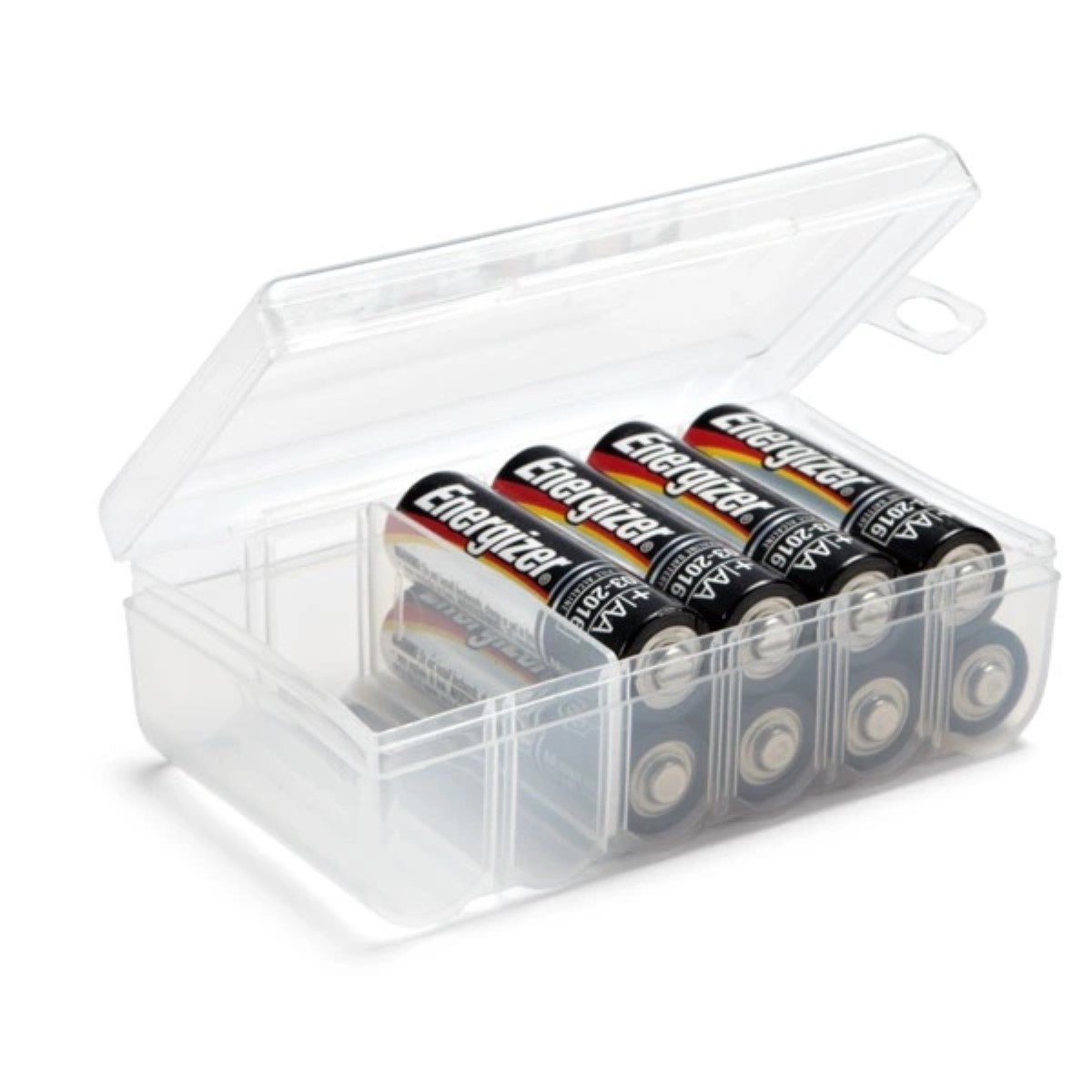

Articles
How To Store Batteries At Home
Modified: January 8, 2024
Learn effective ways to store batteries at home in this informative article. Keep your batteries organized and extend their lifespan.
(Many of the links in this article redirect to a specific reviewed product. Your purchase of these products through affiliate links helps to generate commission for Storables.com, at no extra cost. Learn more)
Introduction
With our increasing reliance on electronic devices, batteries have become an essential part of our lives. From powering our smartphones and laptops to keeping our flashlights and toys running, batteries play a vital role in our daily activities. However, it’s important to understand that proper battery storage is crucial to ensure their longevity and safe usage.
Improper storage of batteries can lead to leakage, reduced performance, and even safety hazards. The good news is that by following some simple guidelines, you can ensure that your batteries stay in optimal condition, saving you money and contributing to a more sustainable lifestyle.
In this article, we will explore the importance of proper battery storage and provide general guidelines for storing batteries, focusing on different types such as alkaline, rechargeable, and lithium batteries. We will also share tips for maximizing battery life and discuss essential safety precautions to keep in mind.
By the end of this article, you will have a clear understanding of how to store batteries at home properly, ensuring their longevity and minimizing associated risks.
Key Takeaways:
- Proper battery storage is crucial for maximizing lifespan, performance, and safety. Following specific guidelines for different battery types ensures optimal conditions and minimizes risks, contributing to a sustainable lifestyle.
- By implementing tips to maximize battery life and prioritizing safety precautions, you can ensure effective and safe battery storage. This not only saves money but also promotes responsible use of battery technology for a sustainable environment.
Read more: How To Store Batteries
Importance of Proper Battery Storage
Proper battery storage is essential for several reasons:
- Prolongs battery life: Storing batteries correctly helps extend their lifespan. Batteries that are exposed to extreme temperatures or stored in conditions that are too humid or dry can degrade faster, leading to reduced performance and a shorter overall lifespan.
- Prevents leakage: Improper storage can result in battery leakage, which can damage your electronic devices and render the batteries unusable. Leakage not only causes a mess, but it can also corrode the battery contacts, preventing proper electrical connections and affecting device performance.
- Enhances performance: Properly stored batteries tend to perform better. They provide a consistent power output, ensuring that your devices run smoothly and at optimal performance levels.
- Reduces safety hazards: Certain types of batteries, such as lithium-ion batteries, can be prone to thermal runaway if stored improperly. This can cause the battery to overheat, catch fire, or even explode. Storing batteries in a safe and controlled environment minimizes the risk of accidents and ensures the safety of your household.
- Economical and eco-friendly: By storing batteries correctly, you can maximize their longevity and minimize the need for frequent replacements. This not only saves you money but also reduces battery waste, contributing to a more sustainable environment.
Overall, proper battery storage is crucial for maintaining their performance, extending their lifespan, and ensuring the safety of both your devices and yourself.
General Guidelines for Storing Batteries
Regardless of the type of battery, there are some general guidelines to follow when it comes to storing batteries:
- Avoid extreme temperatures: Batteries should be stored in a cool, dry place. High temperatures can cause batteries to degrade and lose their charge more quickly, while low temperatures can affect their performance. Avoid storing batteries in areas exposed to direct sunlight or near heat sources.
- Keep batteries in airtight containers: To prevent moisture and humidity from affecting battery performance, store batteries in airtight containers or plastic bags. This helps maintain their optimal conditions and protects them from potential leaks.
- Store batteries in an upright position: Keeping batteries upright helps prevent potential leakage. This is particularly important for alkaline batteries, as they are prone to leakage if stored in an inverted or horizontal position.
- Separate new and used batteries: If you have a mix of new and used batteries, it’s important to store them separately. Used batteries may have a lower charge or be more prone to leakage, so keeping them separate reduces the risk of cross-contamination or accidents.
- Label and organize: It’s helpful to label and organize your stored batteries to easily identify their type, size, and condition. This ensures that you can quickly find the right batteries when needed and makes it easier to keep track of their expiration dates.
- Regularly inspect and replace: Periodically check the condition of your stored batteries. If you notice any signs of leakage, corrosion, or damage, safely dispose of them and replace them with new ones. It’s also important to follow the manufacturer’s recommendations regarding battery expiration dates.
By following these general guidelines, you can ensure that your batteries are stored in optimal conditions, maximizing their lifespan and maintaining their performance for when you need them.
Storing Alkaline Batteries
Alkaline batteries are commonly used in a wide range of devices, such as remote controls, clocks, and toys. Proper storage of alkaline batteries can help maintain their performance and prevent leakage. Here are some specific guidelines to follow:
- Remove batteries from devices: If you’re storing alkaline batteries for an extended period, it’s recommended to remove them from the devices they are powering. This prevents any potential drain on the batteries and ensures that they are stored in an idle state.
- Check battery expiration dates: Alkaline batteries have a shelf life, so before storing them, check the expiration date. Be sure to use the ones that are closest to expiration first to avoid any premature loss of power.
- Store in a cool, dry place: Alkaline batteries should be kept in a cool and dry environment to maintain their performance. Avoid storing them in areas with high humidity or extreme temperatures, as it can shorten their shelf life.
- Do not refrigerate or freeze: Unlike some other types of batteries, alkaline batteries should not be refrigerated or frozen. The cold temperatures can negatively impact their performance and potentially cause leakage.
- Avoid mixing new and used batteries: If you store both new and used alkaline batteries, don’t mix them together. Used batteries may be more prone to leakage, so keeping them separate reduces the risk of contamination.
- Store in an upright position: Keeping alkaline batteries in an upright position helps prevent leakage. Place them in a storage container or organizer where they can stand upright without the risk of falling over or getting damaged.
- Inspect regularly: Periodically check your stored alkaline batteries for signs of leakage, corrosion, or damage. If any issues are detected, dispose of them properly and replace them with new batteries.
By following these guidelines, you can ensure that your alkaline batteries stay in optimal condition and are ready to power your devices when needed.
Storing Rechargeable Batteries
Rechargeable batteries, such as NiMH (Nickel Metal Hydride) and Li-ion (Lithium-ion) batteries, are popular for their eco-friendliness and cost-effectiveness. Proper storage of rechargeable batteries is essential to maximize their lifespan and maintain their performance. Here’s how to store them correctly:
- Charge batteries before storage: Before storing rechargeable batteries, make sure they are fully charged. This ensures that they are ready to use when you need them and helps maintain their overall capacity.
- Store at a moderate temperature: Rechargeable batteries should ideally be stored at room temperature. Avoid extreme heat or cold, as it can negatively impact their performance and longevity. Extreme temperatures can also affect the safety of lithium-ion batteries.
- Avoid over-discharging: It’s important to avoid completely discharging rechargeable batteries before storage. Lithium-ion batteries, in particular, should be stored with a charge level between 20% and 50% to maintain their stability and prevent irreversible damage.
- Keep batteries in a cool, dry place: Similar to alkaline batteries, rechargeable batteries should be stored in a cool and dry environment. Humidity can affect their performance and lead to corrosion, so it’s important to keep them away from moisture.
- Use protective cases or covers: To prevent physical damage and ensure the safety of rechargeable batteries, consider using protective cases or covers for storage. These cases provide additional protection against accidental short-circuiting or physical impact.
- Separate different battery chemistries: If you have different types of rechargeable batteries, separate them based on their chemistries. Mixing different chemistries can lead to voltage mismatches and potential performance issues.
- Inspect and recharge periodically: Rechargeable batteries self-discharge over time, so it’s important to periodically inspect them and recharge if needed. This helps maintain their charge and prevents them from completely draining.
- Follow manufacturer recommendations: Always refer to the manufacturer’s guidelines for specific storage recommendations for your rechargeable batteries. Different battery brands and chemistries may have unique requirements.
By following these guidelines, you can ensure that your rechargeable batteries remain in optimal condition, ready to power your devices efficiently and sustainably.
Store batteries in a cool, dry place at room temperature. Avoid extreme heat or cold, as it can reduce battery life. Keep them in their original packaging or use a battery organizer to prevent contact with metal objects.
Read more: How To Store A Battery
Storing Lithium Batteries
Lithium batteries are commonly used in electronic devices such as smartphones, laptops, and cameras due to their high energy density and long-lasting power. However, they also require proper storage to ensure their safety and optimal performance. Here are some specific guidelines for storing lithium batteries:
- Partial charge: Before storing lithium-ion batteries, it’s recommended to charge them to around 40% to 60% of their capacity. Storing them with a full charge or at very low charge levels for extended periods can lead to capacity loss and potential safety risks.
- Store at a moderate temperature: Lithium batteries should be stored at a moderate temperature range, ideally between 20°C and 25°C (68°F and 77°F). Avoid exposing them to extreme heat or cold, as it can affect their performance and lifespan.
- Avoid moisture or humidity: Lithium batteries are sensitive to moisture and humidity, which can cause corrosion and potential performance issues. Store them in a dry environment and keep them away from areas with high humidity, such as bathrooms or basements.
- Avoid direct sunlight: Keep lithium batteries away from direct sunlight or intense heat sources, as prolonged exposure to high temperatures can cause thermal runaway, leading to battery failure or even fire hazards.
- Store in a protective container: Consider storing lithium batteries in their original packaging or using a protective container specifically designed for battery storage. This helps prevent physical damage, accidental short-circuiting, and exposure to moisture.
- Avoid storing with metal objects: When storing lithium batteries, make sure to keep them away from metal objects, such as keys or coins. Metal objects can cause a short circuit if they come into contact with the battery terminals, leading to potential safety hazards.
- Regularly inspect for damage: Periodically check your stored lithium batteries for any signs of damage, such as dents, bulges, or leakage. If you notice any issues, safely dispose of the batteries following proper recycling guidelines.
- Follow manufacturer recommendations: Always consult the manufacturer’s guidelines for specific storage recommendations for your lithium batteries. Different lithium battery types and brands may have unique requirements.
By following these guidelines, you can ensure the safe and optimal storage of your lithium batteries, enabling them to deliver reliable power and reducing the risk of accidents.
Tips for Maximizing Battery Life
Whether you’re using alkaline, rechargeable, or lithium batteries, maximizing their lifespan is important for both cost-effectiveness and reducing environmental impact. Here are some useful tips to help you get the most out of your batteries:
- Avoid extreme temperatures: High temperatures can accelerate battery self-discharge, while extreme cold can reduce their performance. Keep your batteries in a cool, moderate-temperature environment to help prolong their lifespan.
- Don’t overcharge: For rechargeable batteries, avoid overcharging them. Overcharging can lead to overheating and degrade the battery’s capacity over time. Follow the manufacturer’s recommended charging times and avoid leaving them plugged in for longer than necessary.
- Use the right charger: When recharging your batteries, use a charger specifically designed for the battery type you’re using. Different battery chemistries require different charging techniques, and using the wrong charger can lead to performance issues or even damage.
- Don’t fully discharge rechargeable batteries: While it’s important not to consistently overcharge, it’s equally important not to fully discharge rechargeable batteries. Frequent deep discharges can shorten their lifespan. Recharge them when they reach around 20% to 30% capacity.
- Avoid storing batteries in hot environments: When storing batteries, especially rechargeable ones, keep them away from direct sunlight or environments with high temperatures. Heat can speed up self-discharge and degrade battery performance.
- Remove batteries from devices when not in use: If you’re not using a device for an extended period, remove the batteries. This prevents any potential drain on the batteries and helps conserve their power.
- Follow recommended usage guidelines: Different devices have different power requirements. Always follow the manufacturer’s recommendations for battery usage, such as using the correct battery size and type, to optimize performance and prolong battery life.
- Keep battery contacts clean: Ensure that the battery contacts are clean and free from dirt or corrosion. Dirty contacts can lead to poor electrical connections and reduced battery performance. Clean them with a dry cloth or a mild cleaning solution if necessary.
- Store unused batteries properly: If you have extra batteries that are not currently in use, store them following the appropriate guidelines for the specific battery type. Proper storage helps maintain their charge and overall performance.
- Dispose of batteries responsibly: When it’s time to replace your batteries, be sure to dispose of them responsibly. Many communities have battery recycling programs or collection centers. Recycling batteries helps prevent environmental pollution and allows valuable materials to be recovered.
By implementing these tips, you can maximize the lifespan of your batteries, ensuring that they provide reliable power for your devices and reducing the overall environmental impact of battery usage.
Safety Precautions When Storing Batteries
While proper battery storage is important for maintaining performance and longevity, it’s equally crucial to prioritize safety. Here are some essential safety precautions to follow when storing batteries:
- Avoid mixing different battery types: Different battery chemistries have different voltage levels and storage requirements. Avoid mixing different types of batteries together, as this can lead to voltage mismatches, leakage, or even safety hazards.
- Keep batteries away from flammable materials: Batteries can generate heat and potentially cause a fire. Store batteries away from flammable materials such as paper, fabric, and aerosol cans to prevent accidental ignition.
- Avoid mechanical damage: Handle batteries with care and avoid dropping them or subjecting them to unnecessary physical force. Mechanical damage can compromise the integrity of the battery, leading to leakage or other safety risks.
- Avoid exposing batteries to water: Water and moisture can cause batteries to short-circuit and potentially pose safety hazards. Keep batteries in a dry environment and ensure they are stored in airtight containers or packaging to prevent exposure to moisture.
- Don’t attempt to open or dismantle batteries: Batteries are not meant to be opened or dismantled, especially by untrained individuals. Attempting to tamper with batteries can lead to the release of harmful chemicals and increase the risk of burns or other injuries.
- Dispose of damaged or leaking batteries properly: If you notice any signs of damage, leakage, or abnormalities in your batteries, handle them with caution. Place them in a safe, non-flammable container and follow the appropriate local regulations for disposing of hazardous materials.
- Keep batteries out of reach of children and pets: Batteries can be a choking hazard for small children and can cause harm if ingested. Store batteries in a location that is inaccessible to children and pets to prevent accidental ingestion or misuse.
- Follow local recycling guidelines: When it’s time to dispose of your batteries, follow the recycling guidelines specific to your region. Many communities have designated collection points for batteries, allowing them to be recycled responsibly and safely.
- Be cautious when storing lithium-ion batteries: Lithium-ion batteries have specific safety considerations. Avoid overcharging, exposure to extreme temperatures, or physical damage, as these factors can lead to thermal runaway and potential safety hazards.
- Stay informed and educate others: Stay updated on the latest safety guidelines and recommendations for battery storage. Share this knowledge with others to ensure that everyone in your household or workplace understands the importance of proper battery storage and safety precautions.
By following these safety precautions, you can minimize the risk of accidents, prevent potential hazards, and ensure the safe storage of batteries in your home or workplace.
Conclusion
Proper battery storage is essential for maximizing the lifespan, performance, and safety of your batteries. Whether you’re using alkaline, rechargeable, or lithium batteries, following the right guidelines can make a significant difference in their longevity and functionality.
By storing batteries in a cool, dry place and avoiding extreme temperatures, you can protect them from degradation and prevent potential leakage. Using airtight containers, organizing batteries, and separating new and used ones can also help maintain their optimal condition.
Specific types of batteries, such as alkaline, rechargeable, and lithium batteries, have their own considerations for storage. Understanding the unique requirements of each type ensures that you store them correctly and don’t compromise their performance or safety.
Maximizing battery life is not only cost-effective but also contributes to a more sustainable lifestyle. Avoiding overcharging, not fully discharging rechargeable batteries, and using the right charger are some important tips for prolonging battery life.
Furthermore, it’s crucial to prioritize safety when storing batteries. Avoid mixing different battery types, dispose of damaged or leaking batteries properly, and keep them out of reach of children and pets. Following these safety precautions helps minimize the risk of accidents and ensures the safe storage of batteries.
In conclusion, by following the guidelines for proper battery storage, maximizing battery life, and prioritizing safety, you can ensure that your batteries are ready to power your devices effectively and safely. By taking these steps, you not only save money but also contribute to a more sustainable and responsible use of battery technology.
Frequently Asked Questions about How To Store Batteries At Home
Was this page helpful?
At Storables.com, we guarantee accurate and reliable information. Our content, validated by Expert Board Contributors, is crafted following stringent Editorial Policies. We're committed to providing you with well-researched, expert-backed insights for all your informational needs.















0 thoughts on “How To Store Batteries At Home”